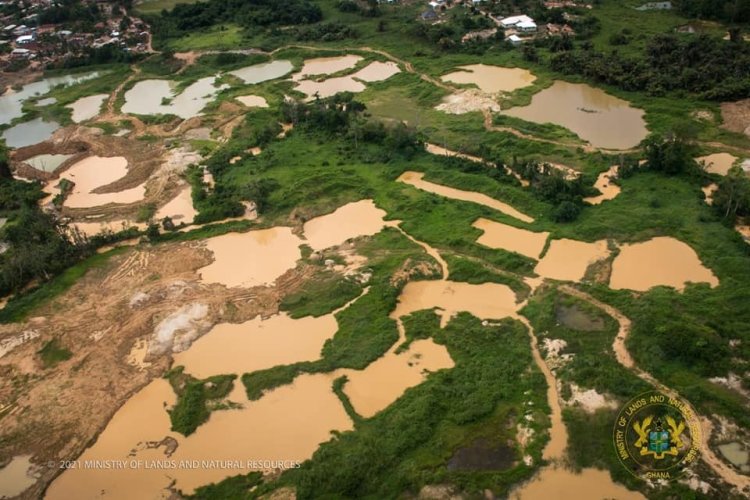Galamsey Menace Deepens, Leaving Devastating Effects on Ghana’s Environment and Economy
Illegal small-scale mining, popularly known as galamsey, continues to pose a major threat to Ghana’s environment and economy. The practice has led to widespread destruction of farmlands, contamination of water bodies, and loss of biodiversity. Despite government interventions and security operations, many communities still grapple with the devastating effects of these activities. Stakeholders are therefore calling for stricter enforcement of mining regulations and sustainable alternatives to protect the nation’s natural resources.


Accra, Ghana — October 1, 2025
The illegal small-scale mining practice locally known as galamsey continues to pose a severe threat to Ghana’s environment, economy, and public health, despite years of government interventions and national campaigns to curb the activity.
From polluted rivers and destroyed farmlands to collapsing communities and lost revenues, the consequences of galamsey have reached alarming proportions, sparking renewed calls for urgent action.
Water Bodies Under Siege
One of the most devastating impacts of galamsey is the destruction of water bodies. Rivers such as the Pra, Ankobra, and Offin, once reliable sources of clean water, have turned brownish and toxic due to the use of mercury, cyanide, and other harmful chemicals in mining operations. The Ghana Water Company has repeatedly warned that treating contaminated water for urban supply is becoming increasingly expensive, with some treatment plants on the verge of shutdown.
“We are fast approaching a crisis where some communities will simply not have access to safe drinking water if galamsey is not brought under control,” an official from the Water Company cautioned.
Environmental Degradation
Illegal mining has also left vast stretches of land scarred and unproductive. Fertile farmlands have been destroyed, forcing many farmers to abandon cocoa and food crop production. Forest reserves, which serve as critical habitats for biodiversity, are being depleted at an alarming rate as galamsey operators encroach deeper into protected zones.
The Environmental Protection Agency (EPA) estimates that Ghana loses thousands of hectares of arable land annually to illegal mining activities, threatening food security and long-term agricultural sustainability.
Health and Social Costs
The human cost is equally worrying. Communities located near galamsey sites report rising cases of skin diseases, respiratory conditions, and mercury-related poisoning. Children and youth are drawn into the practice, dropping out of school to seek quick money, a trend experts say undermines human capital development.
In some mining areas, deadly pit collapses have claimed lives, leaving families devastated and highlighting the unsafe working conditions associated with illegal mining.
Economic Impact
Beyond the environmental and social toll, galamsey is draining the economy of potential revenue. Experts estimate that Ghana loses billions of cedis annually through unregulated gold exports, depriving the state of critical foreign exchange. The Ghana Chamber of Mines has warned that the unaccounted gold output undermines the formal mining industry and discourages legitimate investors.
Government Efforts and Public Call
Over the years, successive governments have launched task forces, military deployments, and community sensitization campaigns to fight galamsey. While some illegal sites have been shut down, the practice often resurfaces, raising questions about the sustainability of enforcement strategies and allegations of political interference.
Civil society organizations, traditional leaders, and environmental advocates are urging a more coordinated and transparent approach that combines strict law enforcement with alternative livelihood programs for affected communities.
“The fight against galamsey cannot be won by slogans alone. It requires political will, community involvement, and genuine alternatives for young people who see no other path to survival,” a policy analyst told reporters.
The Road Ahead
As Ghana continues to grapple with the menace, stakeholders warn that failure to address galamsey decisively could leave irreversible damage to the country’s ecological systems, agriculture, and long-term economic stability.
For now, the brown-colored rivers and gaping pits remain a stark reminder of the urgent need for collective action against illegal mining.
What's Your Reaction?




















